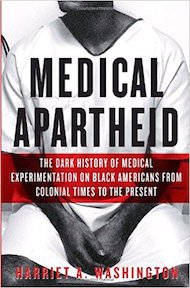AMES, Iowa -- Twenty years ago, then-President Bill Clinton issued a formal apology for the U.S. Public Health Service's 40-year Tuskegee Syphilis Study. During the study, 600 poor African-American men — many with latent syphilis — were unknowingly treated with a placebo so researchers could monitor the disease's progression for decades, long after a treatment was widely available.
Harriet Washington, the author of the first social history of medical research on African-Americans, will discuss the Tuskegee study and other cases of racialized medical research during a talk at Iowa State University.
"Medical Apartheid: The History of Experimentation on Black Americans" will be at 7 p.m. Monday, Sept 18, in the Memorial Union Great Hall. Washington's presentation is free and open to the public. It is part of the university's National Affairs series.

Washington is a medical ethicist and author of the best-selling book, "Medical Apartheid: The Dark History of Medical Experimentation on Black Americans from Colonial Times to the Present." The book won the National Book Critics Award for Nonfiction, a PEN Award and several other honors. Washington argues that the cultural memory of medical experimentation has created a complex relationship between racism and medicine, shaping blacks' distrust toward the medical establishment.
She also is the author of "Deadly Monopolies: The Shocking Corporate Takeover of Life Itself --And the Consequences for Your Health and Our Medical Future." Her most recent book, "Infectious Madness," looks at the connection between germs and mental illness.
Washington has been a fellow in ethics at the Harvard Medical School, a fellow at the Harvard School of Public Health and a senior research scholar at the National Center for Bioethics at Tuskegee University. She worked as a journalist and editor for USA Today and several other publications, was a Knight Fellow at Stanford University, and has written for such academic forums as the Harvard Public Health Review and The New England Journal of Medicine.
Washington's presentation is co-sponsored by the African and African American studies program; bioethics program; biomedical sciences department; genetics and genomics program; genetics, development, and cell biology department; history department; College of Liberal Arts and Sciences Miller Lecture Fund; MFA program in creative writing and environment; neuroscience graduate program; psychology department; sociology department; toxicology program; University Library; and the National Affairs series and the Committee on Lectures, which are funded by Student Government.
More information on ISU lectures is available online, or by calling 515-294-9935.
